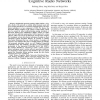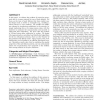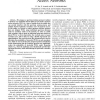34 search results - page 5 / 7 » Byzantine replication under attack |
SRDS
2007
IEEE
14 years 1 months ago
2007
IEEE
Fault tolerant distributed protocols typically utilize a homogeneous fault model, either fail-crash or fail-Byzantine, where all processors are assumed to fail in the same manner....
INFOCOM
2008
IEEE
14 years 1 months ago
2008
IEEE
Abstract—Distributed spectrum sensing (DSS) enables a Cognitive Radio (CR) network to reliably detect licensed users and avoid causing interference to licensed communications. Th...
MOBIHOC
2010
ACM
13 years 5 months ago
2010
ACM
In this paper, we address the problem of preserving generated data in a sensor network in case of node failures. We focus on the type of node failures that have explicit spatial s...
NSDI
2008
13 years 9 months ago
2008
Much recent work on Byzantine state machine replication focuses on protocols with improved performance under benign conditions (LANs, homogeneous replicas, limited crash faults), ...
GLOBECOM
2010
IEEE
13 years 5 months ago
2010
IEEE
We propose a spectrum decision protocol resilient to primary user emulation attacks (PUEA) in dynamic spectrum access networks. PUEA is a type of denial-of-service attack that can ...



